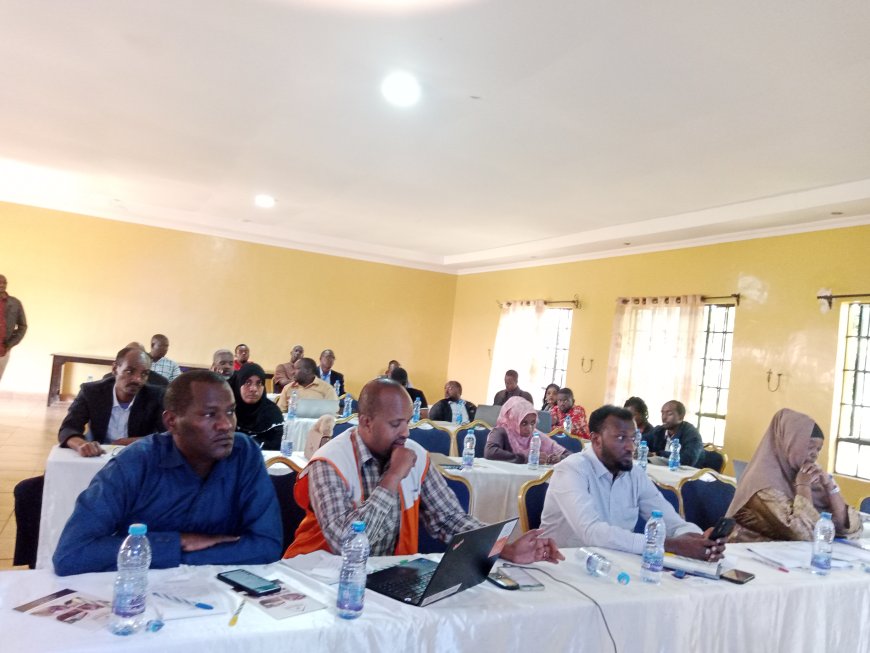Immediate action needed over disruption of life by torrential rains

Marsabit,
Saturday December 2, 2023
KNA by Sebastian Miriti
Over 4,000 households have been affected by the ongoing rains in Marsabit County which has also aggravated the food insecurity crisis for 206,000 people occasioned by the preceding drought.
A multi-sectoral rapid assessment led by the National Drought Management Authority (NDMA) conducted after the highly enhanced rains caused floods found out that 500 households have been displaced from their permanent settlements.
The report that was tabled before the county steering group (CSG) meeting convened at Jirme Hotel & Resort to evaluate the effect of the rains which according to the meteorological department have risen to above normal indicated that 150 pit latrines have sunk in various parts of the county.
The meeting co-chaired by the deputy governor Solomon Gubo and Marsabit deputy county commissioner David Saruni was informed that disruption of life for and human activities cutting across all sectors has occurred with 3 lives having been lost so far.
Outbreaks of torrential rains related diseases like malaria, diarrhea as well as rising cases of malnutrition due to use of contaminated water and inadequate food have been reported with 66,000 households across the county said to be experiencing poor hygienic practices.
The assessment that involved stakeholders like the Pastoralists community initiative and development assistance (PACIDA), Concern-Worldwide and the World Food Programme (WFP) noted that 9,200 households in the four constituencies of Moyale, Saku, North Horr and Laisamis that rely on integrated medical outreaches have been cut-off by inaccessible roads and flooded seasonal rivers.
The county executive member for health (CECM) Grace Galmo said that health activities which include referrals, nutrition support, immunisation and vaccinations have been completely disrupted.
She pointed out that distribution of drugs to health facilities as well as the interventions like supply of aquatabs, insecticide treated nets and food cannot be executed because the road network has broken down.
The assessment established that 12,033 kilometers of road have been destroyed rendering 31 major link roads impassable and cutting off thousands of residents from supply of essential goods and services.
The rains which continue to wreak havoc in the region have also cost the local pastoralist communities a fortune after sweeping away 887 livestock which include 595 goats, 260 sheep, 22 camels and 10 heads of cattle.
The education sector has also been hard hit where infrastructures like classrooms, kitchens and ablution blocks which in line with the report will require Sh 90,620,000 to reconstruct.
The rains have destroyed 8 kitchen facilities, ripped off roofs, submerged 33 toilets and reduced 62 classrooms to a state of not being habitable in various schools across the county
An outbreak of livestock diseases like orf and foot rot has been recorded in the region with the county government strategising on interventions.
The chief officer (CO) for livestock Dr Arero Halikano said that a two week intensive vaccination is planned from next week against the threat of rift valley fever brought about by mosquito infestation.
The Co said the county government has purchased adequate vaccines and drugs and was teaming up with some stakeholders in the sector on logistics.
The deputy governor underlined the need for early recovery action in order to normalise the situation.
Mr Gubo called on people living on lowlands to heed the advice from the government and move to safer grounds.
He cautioned against building homes and other human activities on seasonal water ways adding that those evacuating to higher grounds should never resettle in the same areas after the rains.
“It is prudent that the destroyed roads network be fixed without delay in order to normalise operations,” he said and called on donors to compliment the government effort in salvaging the situation through provision of shelter, wholesome water, sanitation, healthcare, and livelihood support to the vulnerable groups.
Mr Gubo added that monitoring of the situation should be continuous in order to ensure that evolving needs are addressed besides ensuring that the recovery process was sustainable.
Courtesy; KNA
What's Your Reaction?



































































































































































































































































































